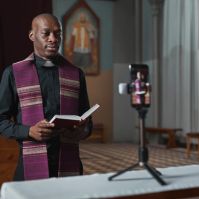Ancient questions continue to meet modern technology in unexpected ways, most recently with questions related to artificial intelligence. As AI grows more sophisticated, spiritual communities grapple with profound questions about consciousness, soul, and what makes us human.
Religious leaders and tech experts increasingly engage in meaningful dialogue about AI's role in spiritual life. Between wonder and wariness, these conversations reveal how technology challenges and enriches our understanding of faith.
How Does AI Challenge Our Spiritual Understanding?
Artificial intelligence pushes us to examine fundamental beliefs about consciousness and the divine. Religious scholars and scientists find common ground in exploring what separates human awareness from machine learning. Rather than threatening faith, these discussions often deepen our appreciation for human spirituality's unique qualities.
Redefining Consciousness
Modern AI systems process information and respond with remarkable sophistication. However, human consciousness encompasses more than data processing—it includes self-awareness, emotional depth, and spiritual connection. Understanding these differences helps clarify what makes human spirituality distinct and precious.
Finding Common Ground
Scientists and religious leaders increasingly work together to understand AI's implications. Their collaborative efforts reveal surprising insights about human nature, consciousness, and the role of technology in spiritual growth. Open dialogue creates space for both scientific advancement and spiritual wisdom.
What Makes Human Spirituality Unique?
The human spiritual experience involves elements AI cannot replicate. These include genuine empathy, moral wrestling, and transformative personal growth. People form authentic connections through shared struggles and celebrations. Faith communities thrive on these deeply human experiences that machines cannot truly simulate.
Beyond Algorithms
While AI excels at pattern recognition and problem-solving, human spirituality draws from wells of lived experience, emotional intelligence, and moral understanding. Prayer, meditation, and worship involve more than words - they encompass feelings, intentions, and genuine connection with something greater than ourselves.
Nurturing Authentic Connection
Faith communities provide spaces for real human interaction, emotional support, and spiritual growth. These connections flourish through shared experiences, mutual vulnerability, and collective wisdom passed down through generations.
Where Does AI Fit in Spiritual Life?
Rather than replacing human spirituality, AI offers tools to enhance religious practice and learning. Digital platforms can make sacred texts more accessible, facilitate global prayer networks, and help preserve religious traditions. Understanding AI's proper role allows faith communities to use technology wisely.
Supporting Spiritual Practice
AI systems help organize religious resources, translate ancient texts, and connect believers across distances. Smart applications remind people of prayer times, share daily devotionals, and facilitate virtual study groups. Technology serves as a tool for spiritual growth rather than its source.
What Can AI Teach Us About Ourselves?
Looking at artificial intelligence helps us more clearly mirror our own spiritual nature. When machines replicate human-like responses, we see more distinctly what makes our own experiences meaningful. Our capacity for doubt, wonder, and faith stands out in sharper relief against artificial systems that can only simulate these experiences.
Learning Through Contrast
Studying AI's limitations illuminates human spiritual gifts. Our ability to find meaning in suffering, experience transcendent joy, and form deep spiritual bonds becomes more apparent when we understand what machines cannot do. Contemplating artificial consciousness leads many to a deeper appreciation of human spiritual capacity.
Moving Forward with Wisdom
The future relationship between AI and spirituality requires careful navigation. Religious communities need to balance technological benefits with maintaining authentic human connections. As AI capabilities grow, people of faith can approach these changes with hope and discernment.
It’s important to remember that questions about AI and spirituality ultimately lead us back to timeless human experiences of faith, community, and meaning. Technology may challenge traditional views but also invites deeper exploration of what makes human spiritual connection unique and irreplaceable.



